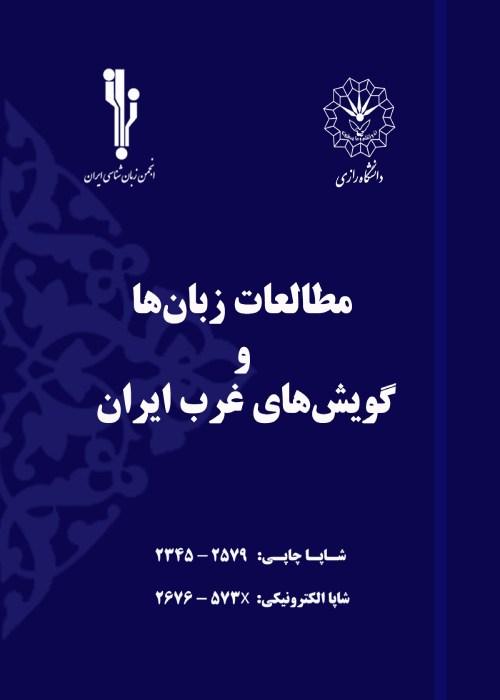The Structure and Function of Questioning in Interrogation Discourse (The Case Study of Doroud City)
The current research is an attempt to analyze the different structural, semantic, and pragmatic dimensions of "questioning" in trial discourse. The basic questions raised in this regard are: what question forms does the interrogator use in the discourse? And what pragmatic criteria make the choice of one question form superior to another? The data of the present research is taken from cross-examination of the witness in the criminal and civil courts and prosecutor's office of Doroud city. We have applied a combination of quantitative and qualitative approaches to analyze the data. In the quantitative dimension, we measured the types of question forms, and in the qualitative dimension, the types of pragmatic strategies were considered, and in this regard, we mainly used the opinions and methodology of Woodbury (1984) and Gibbons (2003). Questions are categorized in terms of structure and meaning, and they can be placed in five categories of Wh-questions, yes/no questions, alternatives, tags, and declarative questions (Biber et al., 1999). Wh-questions are also divided into broad and narrow categories (Woodbury, 1984). Gibbons (2003) explores the types of pragmatic strategies that each participant in judicial discourse uses during questioning and answering. The desired strategies are placed in a general division into two categories, person-targeted and idea-targeted. The first strategy refers to methods that question the character and identity of people, and the second category targets their opinions and statements.
The present article is part of a research that studies "the role of questions in judicial discourse" in three contexts of criminal, family, and civil courts of Dorud city. The overall corpus contains about 100 thousand words collected in the period from 10/12/1401 to 03/20/1402 from different courts. Then we tagged the data according to research objective -question forms- using Python software (3.10.11). In order to maintain the balance of the corpus, we tried to extract equal number of words from each context as possible. 4963 words are related to the criminal context and 5160 words are related to the legal context. In order to examine the data, we have mainly used quantitative and qualitative approaches. In the quantitative dimension, we have analyzed the types of question types and in the qualitative dimension, we have explained and described the types of verbal strategies in judicial discourse. In order to protect people's privacy, all information such as first and last name, names of specific places and any information that determines the identity of people in some way has been removed.
The findings show that the interrogator (including prosecutor, investigator and judge) uses different types of questions such as broad and narrow wh-questions, declaratives, tags, yes/no, yes/no negative and alternatives in their interaction with the lay participants. Figure 1shows the distribution diagram of the types of question forms in the corpus: Figure 1. Distribution of question forms in witness interrogation in criminal and civil courtsEach of the mentioned types also has its own pragmatics effect and that is the degree of control and limitation of the desired answer. As a result, from this point of view, it can be assumed that there is a continuum of the degree of control of different types of questions,which may change depending on the context. In addition to the structural aspects and components related to the type of question, each participant in the interrogation discourse uses strategies to achieve their goals. Regarding the discourse of the interrogation and specifically the interrogation of the witness, the findings indicate that the interrogator can implement the type of questions depending on the goal he is pursuing in the form of strategies that can either express doubts about the personal competence of the witness or directly contradict his statements. In addition to interrogating the witness, as an active participant in the discourse, he can use strategies according to the situation he is in and the answer he wants. We introduced the types of pragmatic strategies used in the present corpus as follows: reformulation, repetition, contrast, presupposition, distortion of modality, etc. It is worth noting that although the interrogator as a participant with "power" has the most important tool of exercising dominance - question - in the discourse, but other participants can also achieve their goals in a limited way by using linguistics devices (such as lexicon choice and counter questioning) that have their own pragmatic effect. It should be noted that the types of strategies in the court discourse are not limited to those mentioned in the present study and it is obvious that more diverse and significant results can be obtained in other contexts and with the presence of other participants. In addition, some discourse markers that are specific to judicial and interrogation discourse have been left out due to lack of space, but they play a central role in the formation of said discourse (such as turn taking, interruption, interference, etc.) and therefore other researches should be conducted to can cover different dimensions of judicial discourse.
- حق عضویت دریافتی صرف حمایت از نشریات عضو و نگهداری، تکمیل و توسعه مگیران میشود.
- پرداخت حق اشتراک و دانلود مقالات اجازه بازنشر آن در سایر رسانههای چاپی و دیجیتال را به کاربر نمیدهد.



